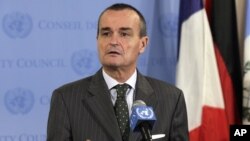NEW YORK — The United Nations Supervison mission in Syria, or UNSMIS, will end on Sunday. French Ambassador Gerard Araud, the current president of the Security Council, says members agreed not to renew the UNSMIS mandate. The U.N. will instead open a liaison office in Damascus.
The U.N. Security Council has decided not to renew the UNSMIS mandate. Ambassador Gerard Araud says there was a general feeling among Council members that the conditions to continue UNSMIS were not fulfilled. He says violence in Syria has not been significantly reduced and the Syrian government has not stopped use of heavy weapons.
“Yes, UNSMIS will fade out, but there will be - what is the most important - there will be a U.N. presence and we do hope, a useful U.N. presence,” said the ambassador.
The UNSMIS 90-day mandate began in April. It authorized a 300-member observer mission to monitor cessation of violence in Syria by all parties and to support implementation of the U.N. Syrian envoy’s six-point peace plan.
Russian U.N. Ambassador Vitaly Churkin suggested other Security Council members did not do enough to halt the violence.
“We believe that those members of the Council who insisted that UNSMIS can continue, did not really show commitment to ending hostilities and to working toward a political settlement in Syria,” said Churkin.
Western members of the Security Council offered three resolutions to apply sanctions to pressure the Syrian government to end fighting. Russia and China vetoed the measures.
The assistant secretary general for U.N. peacekeeping operations, Edmond Mulet, says the size of the organization’s Damascus liaison office has yet to be determined. He noted, however, it will not be large - about 20 to 30 people. The office is to deal with civil affairs, human rights and humanitarian access.
The U.N. Security Council has decided not to renew the UNSMIS mandate. Ambassador Gerard Araud says there was a general feeling among Council members that the conditions to continue UNSMIS were not fulfilled. He says violence in Syria has not been significantly reduced and the Syrian government has not stopped use of heavy weapons.
“Yes, UNSMIS will fade out, but there will be - what is the most important - there will be a U.N. presence and we do hope, a useful U.N. presence,” said the ambassador.
The UNSMIS 90-day mandate began in April. It authorized a 300-member observer mission to monitor cessation of violence in Syria by all parties and to support implementation of the U.N. Syrian envoy’s six-point peace plan.
Russian U.N. Ambassador Vitaly Churkin suggested other Security Council members did not do enough to halt the violence.
“We believe that those members of the Council who insisted that UNSMIS can continue, did not really show commitment to ending hostilities and to working toward a political settlement in Syria,” said Churkin.
Western members of the Security Council offered three resolutions to apply sanctions to pressure the Syrian government to end fighting. Russia and China vetoed the measures.
The assistant secretary general for U.N. peacekeeping operations, Edmond Mulet, says the size of the organization’s Damascus liaison office has yet to be determined. He noted, however, it will not be large - about 20 to 30 people. The office is to deal with civil affairs, human rights and humanitarian access.





